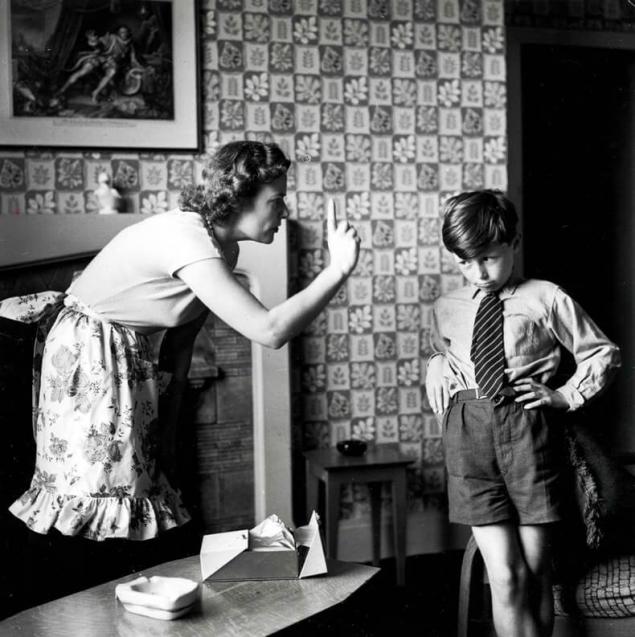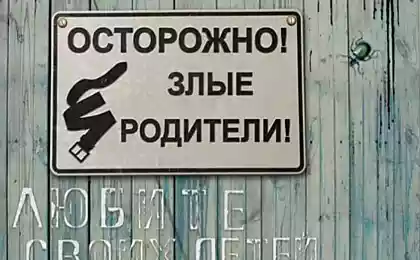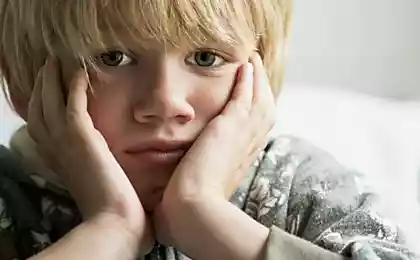455
"You're not our son!" — about those who were raised "Stivali"
When 20 years ago I worked as a school teacher (young and inexperienced), I have clearly identified two categories of parents who came to school. It is clear that to call the school for parents to praise their children, 20 years ago it was not accepted. In my opinion, it is not accepted now, which is a pity.
But even those who were summoned to talk about underachieving or mischief the children acted differently. There were those that listened to the tirade of the teacher with a pained expression on his face, looking at the child with an expression of "well, how could you?!" They are more silent, and at the end said, "We will understand." And walked away, discussing something with a child, quite emotional on the way to the exit.

But more then 20 years ago, the parents said something like: "I don't know who he is? Everyone in our family is normal, and this — losers". Or: "Here is what to do with it? Would have stayed in the army, there are those who will." Or even: "we don't know what to do with it. Chemicals do not want to learn in veterinary school doesn't. Reading his books, a literary institution going. That's not our blood, we have all hands working, not the language ground!"
In the first case, the child recognizes the parents as "his". That's what's behind their words: "This is our baby, he is a member of our family, his problem is partly our problem. If he was born in our family, hence, the problem also is related to all of the family." No one takes responsibility for the child's behavior with the child. But, very importantly, share it. Because the child differs from the adult exactly what does not understand the remote consequences of their behavior and because of the immaturity of many of the functions of the higher nervous activity not all of their impulses is capable of controlling.
Adults, sharing responsibility with the child, show you how to be an adult: to share responsibility for what has spawned or created, not to abandon it. This responsibility sounds for baby message: "You made improper act, but you're our, we will not abandon you. We will help you to fix it or to apologize, we will teach you how to do next time in this situation, we're old enough to help you. You're just like us, you are younger, but that doesn't mean that you're worse than those who are older you just have less experience. No matter what, no matter how you behaved, you will remain a member of our family"
Parents from the second example I'm talking about call themselves "studiesi". As soon as something happens that is not consistent with "the right way the kid from "the right family, this "broken" part is isolated. Caught like a lizard dropping tail to save his own life, a parent "cuts off" from the family of the offending child. "It is not ours", "he's not like us", "we do not understand how that had increased." We have something good. The mother of three jobs back bends, father a PhD, and a daughter, only boys in mind. Rather, who is married took. To officially "not ours". The message that is given to the child: "We do not want for you to blush. You did — you and rake. You should be ashamed. You're not our, because we're good. You're a stranger, because it is bad. Fu to be!"

The apotheosis of such a relationship — a phrase that is uttered in the hearts of parents: "You're not our son!" or "You're not my daughter!". Sometimes they are afraid of, said. And often not.
Especially when you say that grown-up children: "If you marry Zina — you are not our son" or "If you bring in the hem — you're not our daughter!".
It is a terrible curse. After all, the child has no power to cancel the fact of his birth. In any way, other than suicide, the child cannot undo the fact that he was born, these moms and dads.
This parent has the physical ability and the power to abandon the child: give it to an orphanage or up for adoption, delegate-hour care of grandparents or nannies, boarding schools or private schools, to change the child's name, change the name, change the composition of the family.
The child does not possess such abilities, he is not in control of anything, he is a subordinate part of this system. And he has no power in response to "you're not my son anymore" say, "then you're not my mother." Because parents, even rejecting the child, still require from him obedience, as the only adult in charge of his life. And it turns out: "You're not my daughter, but do us, your parents, all right."
For 20 years I've seen lots of the fate of those who were brought up "Stivali". Almost all have spent the best years of his life to prove his studiesm that they deserve to be called "his". This files most often unsuccessfully. Decades perfect obedience could be stroked with just one wrong move and a stone called "I just want to be called your child" had to roll up the hill again with the foot.
Parents raising children in a culture of rejection, themselves grew up in. Generation of parents have learned well that for misconduct in school could easily "exclude from the pioneers", "to exclude from the Komsomol" — when "their" reject the bad "alien." The culture of boycotts, when "We all together ignore Allco of 8-b, because she's wearing jeans and chewing gum".
Rejection is one of the most painful effects on a person. Man is a social creature and most people unbearable to feel like an outcast. And from this point of view, the rejection effectively for "education" about the same as any other torture or corporal punishment. The latter has long prohibited by law. But the rejection is used everywhere — in families and in corporations.
Also interesting: a letter from the Director of the school, which is worth a read by all parents
The more howling of the suffering of the young, the less opportunities for real teen
The consequences of this education — the continuation of the relay rejection. But it's not the worst. Torture rejection, like any other torture, can lead to such things that a person would never commit, being supported by his family or any other community of "their". published
Author: Svetlana Panina
Source: svetlana-panina.livejournal.com/552149.html
But even those who were summoned to talk about underachieving or mischief the children acted differently. There were those that listened to the tirade of the teacher with a pained expression on his face, looking at the child with an expression of "well, how could you?!" They are more silent, and at the end said, "We will understand." And walked away, discussing something with a child, quite emotional on the way to the exit.

But more then 20 years ago, the parents said something like: "I don't know who he is? Everyone in our family is normal, and this — losers". Or: "Here is what to do with it? Would have stayed in the army, there are those who will." Or even: "we don't know what to do with it. Chemicals do not want to learn in veterinary school doesn't. Reading his books, a literary institution going. That's not our blood, we have all hands working, not the language ground!"
In the first case, the child recognizes the parents as "his". That's what's behind their words: "This is our baby, he is a member of our family, his problem is partly our problem. If he was born in our family, hence, the problem also is related to all of the family." No one takes responsibility for the child's behavior with the child. But, very importantly, share it. Because the child differs from the adult exactly what does not understand the remote consequences of their behavior and because of the immaturity of many of the functions of the higher nervous activity not all of their impulses is capable of controlling.
Adults, sharing responsibility with the child, show you how to be an adult: to share responsibility for what has spawned or created, not to abandon it. This responsibility sounds for baby message: "You made improper act, but you're our, we will not abandon you. We will help you to fix it or to apologize, we will teach you how to do next time in this situation, we're old enough to help you. You're just like us, you are younger, but that doesn't mean that you're worse than those who are older you just have less experience. No matter what, no matter how you behaved, you will remain a member of our family"
Parents from the second example I'm talking about call themselves "studiesi". As soon as something happens that is not consistent with "the right way the kid from "the right family, this "broken" part is isolated. Caught like a lizard dropping tail to save his own life, a parent "cuts off" from the family of the offending child. "It is not ours", "he's not like us", "we do not understand how that had increased." We have something good. The mother of three jobs back bends, father a PhD, and a daughter, only boys in mind. Rather, who is married took. To officially "not ours". The message that is given to the child: "We do not want for you to blush. You did — you and rake. You should be ashamed. You're not our, because we're good. You're a stranger, because it is bad. Fu to be!"

The apotheosis of such a relationship — a phrase that is uttered in the hearts of parents: "You're not our son!" or "You're not my daughter!". Sometimes they are afraid of, said. And often not.
Especially when you say that grown-up children: "If you marry Zina — you are not our son" or "If you bring in the hem — you're not our daughter!".
It is a terrible curse. After all, the child has no power to cancel the fact of his birth. In any way, other than suicide, the child cannot undo the fact that he was born, these moms and dads.
This parent has the physical ability and the power to abandon the child: give it to an orphanage or up for adoption, delegate-hour care of grandparents or nannies, boarding schools or private schools, to change the child's name, change the name, change the composition of the family.
The child does not possess such abilities, he is not in control of anything, he is a subordinate part of this system. And he has no power in response to "you're not my son anymore" say, "then you're not my mother." Because parents, even rejecting the child, still require from him obedience, as the only adult in charge of his life. And it turns out: "You're not my daughter, but do us, your parents, all right."
For 20 years I've seen lots of the fate of those who were brought up "Stivali". Almost all have spent the best years of his life to prove his studiesm that they deserve to be called "his". This files most often unsuccessfully. Decades perfect obedience could be stroked with just one wrong move and a stone called "I just want to be called your child" had to roll up the hill again with the foot.
Parents raising children in a culture of rejection, themselves grew up in. Generation of parents have learned well that for misconduct in school could easily "exclude from the pioneers", "to exclude from the Komsomol" — when "their" reject the bad "alien." The culture of boycotts, when "We all together ignore Allco of 8-b, because she's wearing jeans and chewing gum".
Rejection is one of the most painful effects on a person. Man is a social creature and most people unbearable to feel like an outcast. And from this point of view, the rejection effectively for "education" about the same as any other torture or corporal punishment. The latter has long prohibited by law. But the rejection is used everywhere — in families and in corporations.
Also interesting: a letter from the Director of the school, which is worth a read by all parents
The more howling of the suffering of the young, the less opportunities for real teen
The consequences of this education — the continuation of the relay rejection. But it's not the worst. Torture rejection, like any other torture, can lead to such things that a person would never commit, being supported by his family or any other community of "their". published
Author: Svetlana Panina
Source: svetlana-panina.livejournal.com/552149.html
Why you should not allow strangers in your bedroom
The question that must be resolved BEFORE marriage























